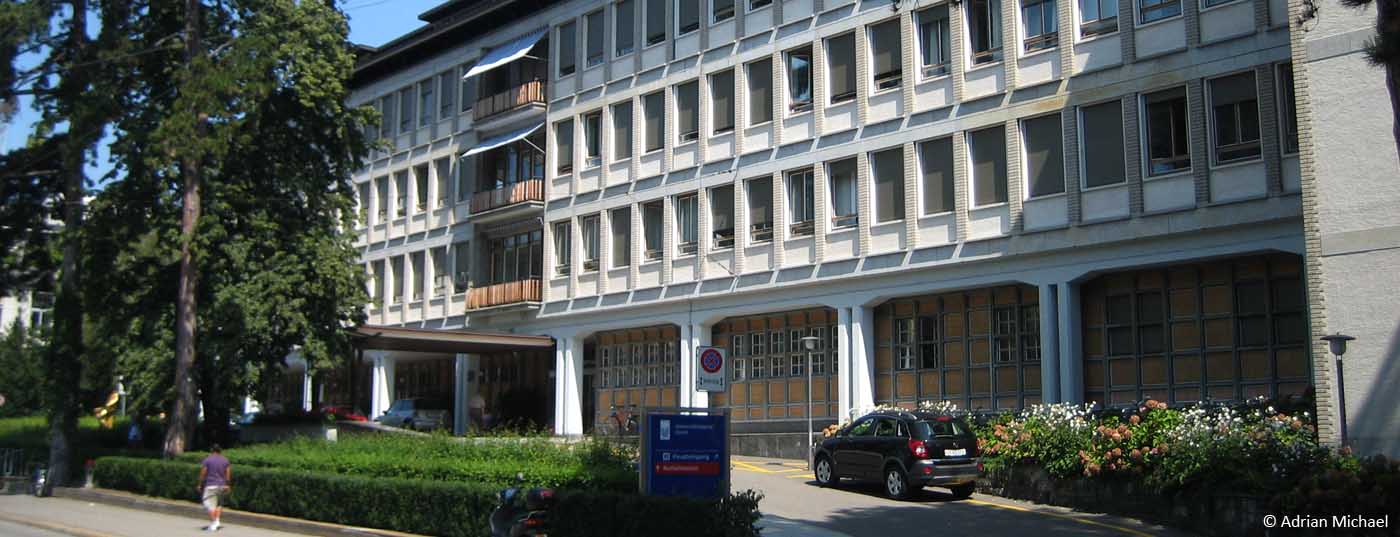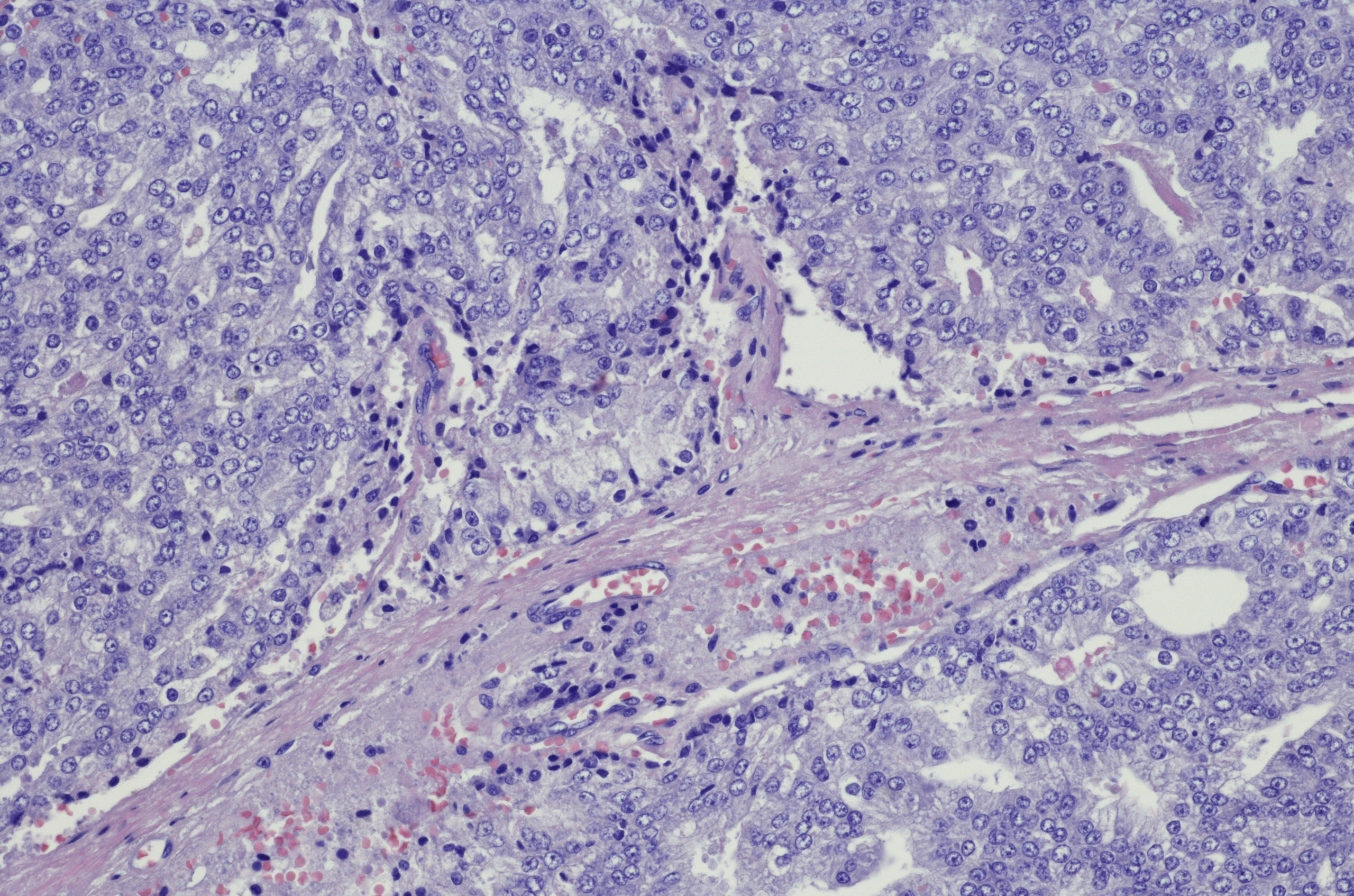The Dermatological Clinic of the University Hospital Zurich (DER USZ) occupies a prominent place within the dermatological university hospitals of Europe. In recent years, it has consistently ranked among the top three in terms of its scientific papers (Citation Index). However, the focus is on the patients who entrust us with their health fate. They are our motivation for this high performance in clinical work and in research for constantly improving diagnostics and therapy. Last but not least, one of the most important tasks remains to pass on this knowledge to young doctors and nurses.
The Dermatology Clinic at the University Hospital Zurich was founded in 1916 by the first chair holder, Prof. Bruno Bloch, a pioneer of functionally oriented translational medical research and dermatology, and within a very short time became known throughout Europe. Since then, the dynamism with which modern dermatology has been produced and practiced for the benefit of patients has never diminished. An overview of the clinic’s impressive history is provided in Table 1.

However, the focus of this article, which is published on the occasion of the 100th anniversary of the Swiss Society of Dermatology and Venereology (SGDV), shall be on today and tomorrow.
From the beginnings to modernization of dermatology
Dermatology is an organ specialty (like ophthalmology, for example) and the skin is also a model organ on which diverse physiological and pathophysiological processes can be studied in an exemplary manner due to its easy accessibility. Skin diseases have always played an extraordinarily important role in the population. Until more modern times, skin diseases were often extremely stigmatizing for those affected and difficult to treat. The skin patients were segregated from society, and the nursing stations for skin patients were often found outside the city walls (cf. Left column in Tab. 1).
The introduction of antibiotics led to a drastic shift from severe skin diseases of infectious nature to severe skin diseases of non-infectious nature, which from then on became the focus of dermatology, without disregarding infections, especially venereology.
In the past two decades, however, the field of dermatology has undergone rapid modernization due to the epidemic-like increase in skin cancer on the one hand, and the unprecedented developments in molecular medicine and immunology and the targeted therapies derived from them on the other.
In the process, dermatology has gained such momentum that some of the newly acquired knowledge is being applied and disseminated in other medical specialties and non-dermatological disease patterns.
Focal points at the DER USZ
At the Department of Dermatology at the University Hospital Zurich, the organ specialty of dermatology is practiced in its entire breadth, including all subdisciplines. Three areas of work are the focus of professional development. The Allergy Ward of the Dermatology Clinic, which has achieved international renown under Prof. Brunello Wüthrich, is one of the reference departments of its kind. Prof. Peter Schmid-Grendelmeier and Prof. Barbara Ballmer-Weber lead the Allergy Ward in all aspects of clinical practice and clinical research. They are supported in their research by Prof. Onur Boyman, Dr. Ulf Petrausch and PD Dr. Wolfram Hötzenecker.
The second focus is on the clinic and research of inflammatory skin diseases, the oldest core area of the specialty of dermatology. Here, Prof. L. French, PD Dr. Thomas Kündig, Prof. Onur Boyman and Dr. Emmanuel Contassot lead clinical care, clinical research and basic research, together with several younger junior clinicians whose projects are currently unearthing highly regarded results.
Skin cancer is the most recent focus of the specialty of dermatology. It is driven by the incredible momentum of the so-called skin cancer epidemic. This focus includes both prevention and therapy, conservative and surgical treatment, clinical care and research, and basic science. The overall area is headed by Prof. Reinhard Dummer, together with Prof. Günther Hofbauer, Prof. Ralph Braun and Dr. Simone Goldinger (epithelial skin tumors, melanoma, prevention), PD Dr. Dr. Antonio Cozzio and Prof.Mirjana Maiwald (cutaneous lymphomas), Prof. Jürg Hafner, Dr. Severin Läuchli, Dr. Stephan Nobbe and Dr. Sabine Bruckert (skin cancer surgery), PD Dr. Jivko Kamarachev, Dr. Katrin Kerl and Dr. Christian Bull (dermatohistopathology). Cooperation between these areas has led to several highly successful international projects in recent years. Most important, however, is the optimal care of patients with skin cancer, which is at the very heart of the clinic team. Dr. K. Schad is in charge of the inpatient ward, and PD Dr. Thomas Kündig, Dr. Stephan Nobbe, Dr. Laurence Imhof, Dr. Beda Mühleisen, Dr. Lisa Weibel (pediatrics), Dr. Bettina Rümmelein (laser) and Dr. Michael Geiges (moulage collection) are in charge of the outpatient department (headed by PD Dr. Dr. Antonio Cozzio).
Dermatology as an organ specialty is very much focused on interdisciplinary collaboration. In many complex medical problems, interdisciplinary collaboration is the only way to achieve the goal. Figuratively speaking, dermatology borders “on 360°” on neighboring disciplines. At the USZ, this interdisciplinarity is proactively practiced in practically all relevant situations of everyday clinical life, primarily for the treatment of the affected, often seriously ill patients, but secondarily also for the benefit of research and teaching. We would like to take this opportunity to express our sincere thanks to our more than 40 neighboring disciplines at the USZ.
Future prospects in dermatology
The future of modern medicine, especially in dermatology, belongs to molecular diagnostics and targeted molecular therapies. This development is so complex that it can no longer be successfully carried out by individual people or individual clinics on their own. For the Dermatology Clinic at the University Hospital Zurich, this means that in future years we will increasingly establish or continue collaborations within and outside the USZ. Networked, synergistic teamwork will be one of the key factors for future success. Since resources in medicine in particular and on earth in general are not unlimited, careful cost-benefit considerations will have to accompany this development, and Western societies will not be able to avoid a transparent discussion of which medicine they will want in the future.
The Dermatology Clinic USZ, with its currently extremely motivated and high-performing team, is ready to take on these challenges together with its partners. First and foremost, these efforts benefit our patients in the Zurich area, but secondly, they also benefit people with skin diseases outside our direct sphere of influence. To witness this progress is a great privilege for all of us, which constantly motivates us to continue on this path.
Prof. Dr. med. Jürg Hafner
Michael Geiges, MD
Prof. Dr. med. Günter Burg
Prof. Dr. med. Lars E. French












